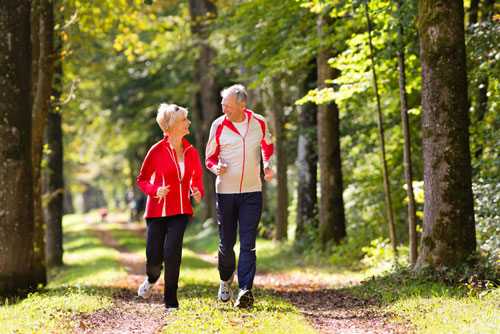It’s easy to be depressed about our coronavirus-infested world.
Many of us have lost our jobs. We’ve seen our investments tank. We wake up each morning fearing that this will be the day that we or someone we care about will get sick.
It’s natural to be sad. But new research shows there’s something you can do about it.
The study was published in the journal Health Psychology. It looked at the psychological effects of exercise on mentally healthy people.
This was one of the first studies of its kind. Similar research in the past has tested exercise in people suffering from serious mental illnesses. Or the studies were observational. That means scientists looked at people’s lives and found that active people were happier. But that didn’t address whether being active was the cause of better moods.[1]
For the new study, researchers at Columbia University recruited 119 adults with no serious mental health issues. The subjects were not exercisers before the study began.
Scientists randomly placed the subjects into two groups. One continued their lives as normal. The other began an exercise regimen that including walking, treadmill running, and stationary biking.
They did 35-minutes of exercise four times a week. Participants aimed to raise their heart rate to 70% to 80% of their maximum.
After three months, the subjects who exercised scored higher on mood tests. Their depression scores dropped by 35%. They felt less anxious and hostile. The non-exercise group did not have the same benefits.
The exercisers felt so good “Most of them didn’t much want to quit,” said Professor Richard P. Sloan. He oversaw the study.
Professor Kathleen McIntyre, another author of the study, said that during the coronavirus pandemic it “reminds us that we have this coping tool available.”
If you can exercise, “it should help with the negative feelings that just about everyone is experiencing right now,” she said.[2]
The Best Way to Boost Your Mood With Exercise
In 2015, researchers at Rutgers University found a way to make exercise even more effective: Combine it with meditation.
It’s long been known that exercise and meditation ease depression. But this was the first time they were tested together. There appears to be a synergistic effect.
The regimen used in the study was not difficult or time consuming. It requires just a one-hour session twice a week. And it was effective in virtually all participants, cutting depression symptoms by at least 40%.[3]
The program is simple:
- First, meditate for 20 minutes. Do a form of meditation called focused attention. It’s easy.
Simply sit in a quiet place and think about your breathing. Count your breaths up to 10 and then backward from 10. Then do it over again. If your mind wanders, don’t worry about it. Just start over counting from one.
- Then, do 10 minutes of walking meditation. Focus intently on each step. Think, “left, right, left, right” as you put one foot in front of the other.
- Finally, run on a treadmill or use a stationary bike for 30 minutes. Go hard, doing intervals. Rest to catch your breath when needed.
Do this twice a week. You should notice a mood improvement after two months or less.
It’s depressing to watch the pandemic sweep through the world. But physical activity combined with meditation can help you stay mentally strong during the crisis.
Dr. Brandon Alderman was the lead author of the Rutgers study. He said, “In our subjects we saw a very robust effect after only eight weeks.”
Editor’s Note: Discover the single best supplement for stronger immunity… The fruit extract that helps 93% of people with respiratory viruses get better in just two days… The germ hotspot that most of us forget to sanitize. Find all this and more is in Independent Healing’s Coronavirus Pandemic Guide. Go HERE.
Related Articles
Coronavirus: Will Summer Save Us?
The Coronavirus Guide for Getting Food
The Coronavirus Test: How It Works
Like this Article? Forward this article here or Share on Facebook.
[1]https://psycnet.apa.org/record/2020-00792-001
[2]https://www.nytimes.com/2020/04/08/well/move/coronavirus-exercise-depression-anxiety-mood.html
[3]http://news.rutgers.edu/research-news/exercise-and-meditation-%E2%80%93-together-%E2%80%93-help-beat-depression-rutgers-study-finds/20160209#.V-7Lp16QKUk

